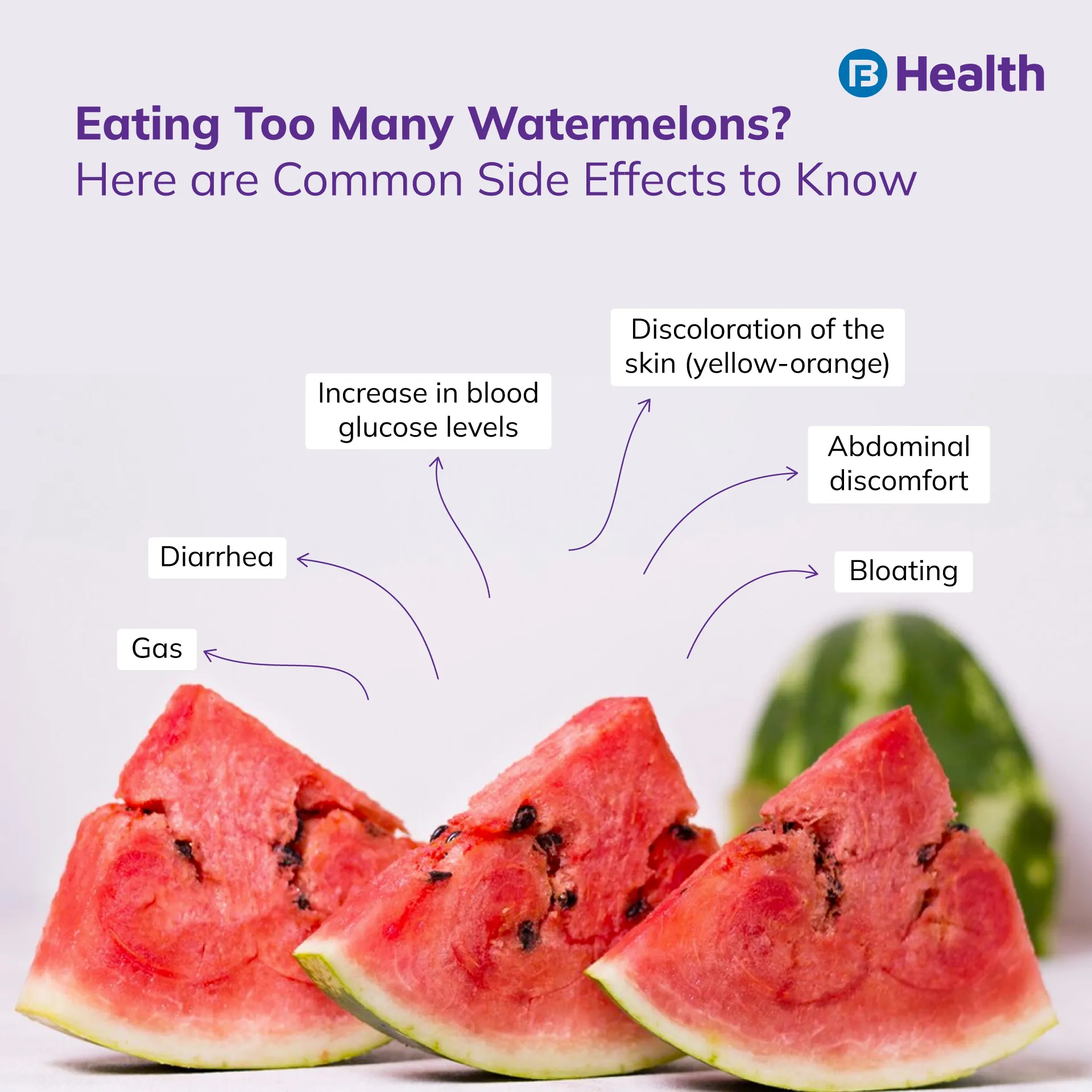General Physician | 4 min read
9 Watermelon Benefits That Make It A Must-Add In Your Diet!
Medically reviewed by
Table of Content
Key Takeaways
- One of the well-known watermelon benefits is its thirst-quenching ability
- One of the health benefits of watermelon is hydrated and healthier skin
- Improved hearth health is one of the watermelon benefits for men and women
Watermelons belong to the Cucurbitaceous family and one of the top watermelons benefits is its ability to quench your thirst, especially in the summer! It was first domesticated for water and food in northeastern Africa nearly 4,000 years ago [1]. With around 90% water content, watermelon helps hydrate your body and satisfy your sugar cravings with its natural sugar.
Owing to its nutritional content, there are many benefits of eating watermelon for your overall health. These health benefits of watermelon can be attributed to its antioxidant content, low-calorie count, essential vitamins, and more. Read on to know the top 9 health benefits of watermelon.
What is the nutritional value of watermelon?
For 100 grams of Watermelon nutritional value is as per following:
- Calories 30
- Total Fat 0.2 g
- Sodium 1 mg
- Potassium 112 mg
- Total Carbohydrate 8 g
- Dietary fiber 0.4 g
- Sugar 6 g
- Protein 0.6 g
- Vitamin C 13%
- Iron 1%
- Magnesium 2%
Watermelon Benefits
hydration
Hydration is key to ensuring that your body functions are healthy and normal. Functions like regulating body temperature, reaching nutrition to cells, alertness, and organ movements heavily rely on your body being adequately hydrated. With around 90% of water content, hydration is one of the top watermelon benefits you can rely on [2].
By staying hydrated, you can get rid of mouth dryness which will help your cardiovascular health. In addition, you can keep yourself cool by consuming watermelon in summer. It cleanses your system and contributes towards healthy skin.
It may possess anti-cancer properties
The plant elements in watermelon, such as lycopene and cucurbitacin E, contain anti-cancer properties. For example, lycopene intake is believed to minimize the risk of some types of cancer, such as colorectal and prostate cancer. This is because it reduces the levels of IGF, a kind of insulin in the blood that controls the effects of growth hormones in the human body. This hormone contributes to cell division, and cancer occurs when there is uncontrollable cell division.
Cucurbitacin E is believed to slow down tumour growth by promoting the normal functioning of the cancer cells. This is a natural process whereby the old, damaged cells are replaced by fresh cells.
Additional Read: Kiwi Fruit Benefits
May prevent asthma
With vitamin C content that helps you meet 14-16% of your daily needs, asthma prevention is one of the benefits of eating watermelon. Vitamin C in watermelons can help reduce the oxidative damage in lungs that can lead to asthma. Though studies have not yet proved that vitamin C can prevent asthma, it can help provide protection. Having sufficient vitamin C is also among the top tips to boost your immunity. Vitamin C is also one of the best ways to increase immunity in kids.
Boosts heart health
Maintaining your heart health is of utmost importance because of the vital role it plays. Improving cardiovascular health is one of the top watermelons benefits for men and women. The heart healthy benefits of eating watermelon come from a nutrient called lycopene. It helps reduce blood pressure, cholesterol, and oxidative damage.Citrulline, an amino acid found in watermelon, may help your body produce more nitric oxide. Your blood arteries widen as a result of nitric oxide, which decreases blood pressure.Magnesium, potassium, vitamins A, B6, and C, as well as other heart-healthy vitamins and minerals, can be found in watermelon.
Reduces muscle soreness
An amino acid called citrulline is found in watermelon and can help you relieve muscle soreness as well as improve your performance during exercise. According to studies, regular citrulline intake can help improve your athletic performance due to the increased production of nitric oxide [3]. Nitric oxide helps expand your blood vessels, which reduces the load of pumping blood on your heart. And thus, drinking watermelon juice benefits your cardiac health too.
Protects your joints
Watermelon contains a substance called beta-cryptoxanthin, a naturally found pigment colour that may prevent the inflammatory condition of the joints. It could decrease the likelihood of rheumatoid arthritis in humans.
It fulfils your cravings for sweets
Watermelon is a very healthy way to satiate your cravings for sweets. It is sugary yet low in calories.
It supports your workout
Consuming watermelon after your workout session helps retain the body's hydration level and will leave your energy intact. It also provides you potassium, as you sweat a lot, resulting in loss of potassium from the body. Additionally, it relieves muscle soreness after a workout.
It keeps your blood glucose level steady
Watermelon has a low glycaemic index, and its carbohydrate level is also low. Therefore, it is a great food if you want to cut down your risk of diabetes or lower your sugar level.
It may cut down inflammation and oxidative stress
Inflammation is known to be one of the major reasons for chronic diseases. Watermelon, with its component of lycopene and vitamin C, is believed to cut down the level of inflammation and the damage caused by oxidative stress to the cells. However, more research is needed in this field to support this hypothesis. It is known to delay the progression of Alzheimer's disease in humans.
It may help prevent macular degeneration
The lycopene substance found in watermelon is believed to benefit your eye health. The older generation often suffers from an eye disorder called macular degeneration. The antioxidant and anti-inflammatory substances found in lycopene may help prevent and restrict this condition.
It can lead to healthy weight management
Because of its high water content, watermelon is low in calories and thus helps in weight management.
Promotes healthy skin
Vitamin A and C are a few vital nutrients that help keep your skin healthy. Due to the presence of these vitamins, one of the best watermelons benefits is improved skin health. Vitamin A helps your skin with create and repair skill cells. Vitamin C, on the other hand, helps boost your skin health by helping your body improve and increase collagen production.
Helps manage metabolic syndrome
Watermelons benefits your health by helping you manage metabolic syndrome, which may come with conditions like obesity [4]. These health benefits of watermelon can be visible in your body in the following ways:
- High levels of antioxidants
- Low BMI and body weight
- Lower blood pressure (systolic)
- Improved waist-to-hip ratio
Has anticancer properties
According to research, free radicals can lead to development of certain cancers. This is because the oxidative stress that free radicals cause can lead to DNA cell damage. Some dietary antioxidants can help prevent certain cancers by helping your body fight off these free radicals. One such antioxidant is vitamin C, which is found in watermelon. Apart from this, the anticancer benefits of eating watermelon also come from the lycopene present in it. As per another study, lycopene can help reduce the risk of prostate cancer [5].

Improves digestive health
Watermelons benefits also include improved digestive health because of its water and fiber content. Though it has a small amount of fiber, both fiber and water are essential to have a healthy digestive system. While fiber helps regulate your bowel movement, water helps move the waste from your digestive tract smoothly. These functions of water and fiber ultimately help in digestion by preventing constipation.
Additional Read: 5 Ways Postbiotic Benefits Your healthHow to incorporate Watermelon into your diet?
You should always pick a ripe watermelon, and the best way to identify it is by looking at its colour, a yellow mark or a ground spot. It must weigh heavy, as this indicates its high-water content. Wash properly before you slice it to prevent bacteria from entering your system.
You can directly consume it, and else you can make several sweet and savoury recipes.
- You can mix watermelon cubes with salads and garnish them with grated ginger, fresh mint, or shredded coconut, as per your choice
- You can prepare skewered watermelon pieces and avocado chunks and serve them as a snack. You can keep them raw or grilled
- You can prepare a watermelon pizza by adding berries, coconut, and yoghurt as toppings to your weight loss diet
- You can make watermelon popsicles or ice pops and consume them in the summer
- Watermelon salsa is another popular recipe that can be prepared by adding watermelon and other ingredients like red onion, jalapeno, cucumber, lime juice, cilantro, etc.
- You can prepare a drink by adding watermelon (without seeds) and fresh lemon juice
- A tasty way to consume watermelon is by dipping its cubes in melted dark chocolate. It is deliciously tasty
What are the potential side effects of Watermelon?
Mostly watermelon does not cause any side effects. However, in the following conditions, it is best to avoid it:
- If you have a migraine problem
Watermelon contains amino acid which aggravates migraine problem.
- If you are allergic to dust and pollens
The allergy symptoms include breathing difficulty, swelling etc., and you should not consume watermelon with these conditions.
- Diabetes patients should be careful about eating watermelon
You should moderately consume watermelon if you have diabetes as it contains natural sugar.
- People with digestive disorders should moderately eat watermelon
Watermelon contains short-chain carbohydrates called FODMAP, and people with irritable bowel syndrome find it difficult to digest them, resulting in constipation, bloating and diarrhoea.
By consuming zinc-rich foods to boost immunity like watermelon seeds, benefits you can enjoy include maintaining good heart health and normal blood glucose levels. With the knowledge of all these watermelons benefits, be sure to make the most of it this summer. However, do eat it in moderation as excess consumption of watermelon can cause side-effects.
If you notice any signs of side-effects or have any health concerns, talk to a doctor. Book an online consultation with top doctors on Bajaj Finserv Health. With teleconsultation, you can get your questions resolved from the comfort of your home. And with guidance from top nutritionists, you can lead a healthier and more active life!
FAQs
Is it good to eat watermelon every day?
You can safely consume watermelon every day. However, the amount should be between 100 to 150 grams.
What does watermelon do for the body?
Watermelon improves blood circulation in the body and helps control your blood pressure level. It is also known to reduce the risk of heart attacks.
Is watermelon OK to eat at night?
There is no theory to support that eating watermelon at night is harmful. But according to Ayurveda, eating watermelon at night may cause IBS and some other digestive issues.
Is watermelon good for you?
Watermelon is a very good fruit for your body as it contains many nutrients and provides various other health benefits.
Are watermelon seeds or rinds okay for you?
Watermelon seeds contain various nutrients like magnesium, potassium and zinc and have a low-calorie count. As a result, they increase your immunity, nourish your heart, and control blood sugar levels.
Does watermelon make you sleepy?
Watermelon promotes sleep because of its high magnesium content. Magnesium is known to improve the quality and duration of your sleep. In addition, it helps your metabolic system to function well and minimizes sleep-related disorders.
Is watermelon good for the kidney or not?
Watermelon is good for the kidney as it contains antioxidants, and it helps to destroy the harmful free radicals in the body and thus prevent injury to the kidney.
Is watermelon good for the liver?
Watermelon contributes to the growth of a healthy liver as it is loaded with vitamins and antioxidants and enables your liver to work properly.
References
- https://www.ncbi.nlm.nih.gov/pmc/articles/PMC4512189/
- https://www.ncbi.nlm.nih.gov/pmc/articles/PMC4464475/
- https://pubmed.ncbi.nlm.nih.gov/27749691/
- https://www.ncbi.nlm.nih.gov/pmc/articles/PMC6470521/
- https://www.ncbi.nlm.nih.gov/pmc/articles/PMC4616444/
Disclaimer
Please note that this article is solely meant for informational purposes and Bajaj Finserv Health Limited (“BFHL”) does not shoulder any responsibility of the views/advice/information expressed/given by the writer/reviewer/originator. This article should not be considered as a substitute for any medical advice, diagnosis or treatment. Always consult with your trusted physician/qualified healthcare professional to evaluate your medical condition. The above article has been reviewed by a qualified doctor and BFHL is not responsible for any damages for any information or services provided by any third party.





